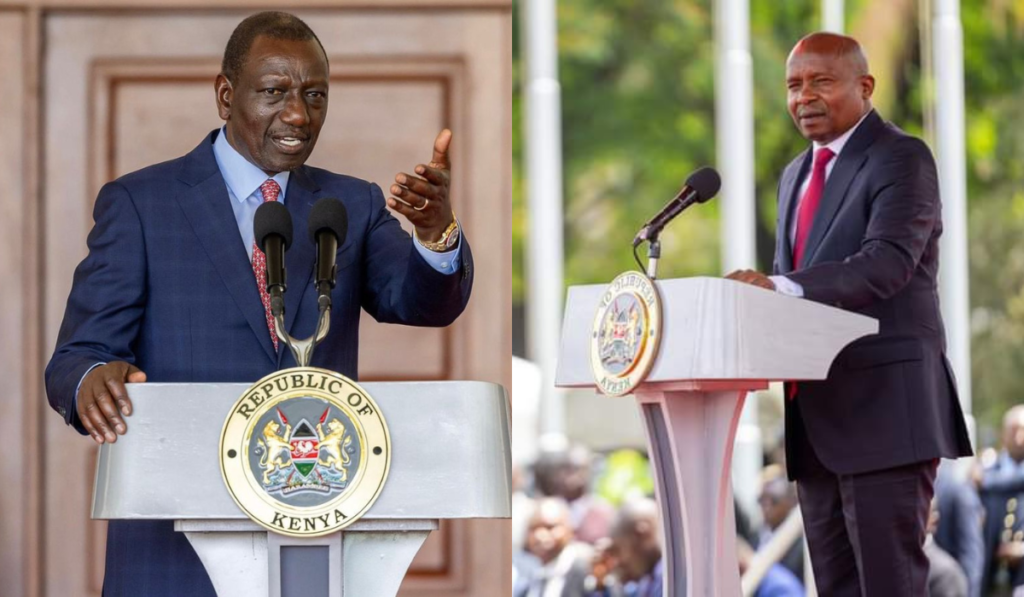
Since President William Ruto took office in September 2022, public trust in his administration has steadily declined. Economic challenges, governance practices, and perceived failures in public engagement have left citizens skeptical of the policies shaping their daily lives. With economic hardship mounting and administrative decisions often ignoring citizen input, trust—a bedrock of effective governance—has eroded. This analysis explores the core causes of this trust deficit, focusing on the administration’s handling of public debt, youth engagement, economic policy, and civic education. Each of these elements has shaped current perceptions of governance, fueling widespread criticism.
The Impact of Public Debt on Trust
Kenya’s public debt, approaching 70% of GDP, has created significant economic strain. Much of this debt was accrued for large infrastructure projects, such as roads and telecommunications, financed by loans from institutions like the International Monetary Fund (IMF), the World Bank, and China. Yet, many Kenyans feel the benefits of these projects remain intangible, with the financial burden broadly felt by the average citizen.
In response, the Ruto administration has implemented austerity measures, including substantial tax hikes under the Finance Act 2023. New policies, like a Value Added Tax (VAT) increase on fuel and a housing levy, have been criticized as regressive, disproportionately affecting lower-income citizens. Many Kenyans view these taxes as a broken campaign promise, as the administration vowed to alleviate living costs. Consequently, a perception has emerged that debt repayment is prioritized over public welfare, deepening public resentment.
Transparency and Governance in Debt Management
Beyond the debt burden, transparency around debt management has further undermined trust. Limited public information on loan terms, total obligations, and fund allocations sparks questions about fiscal responsibility. Allegations of corruption in government projects have amplified skepticism, leading to doubts over whether borrowed funds are used in the public’s best interest. Civic activist Morara Kebaso has worked to expose the corruption embedded in Kenya’s borrowing history, detailing how funds intended for development have been diverted, resulting in incomplete or nonexistent projects. Such revelations fuel a perception of fiscal irresponsibility that has only eroded confidence in the administration’s stewardship.
Economic Dependency and Sovereignty Concerns
Kenya’s reliance on foreign loans has also raised fears about economic dependency and sovereignty. Many Kenyans worry that significant creditors, particularly China, exert undue influence over the nation’s policies. Kenya’s debt to China, estimated at $6.84 billion, has heightened concerns that national autonomy is being compromised. The Standard Gauge Railway (SGR) project, financed primarily by loans from the Exim Bank of China, illustrates these worries. Initially budgeted at $3.2 billion (KSh 360 billion), the project’s total repayment cost has escalated due to interest and currency fluctuations. With a repayment of $536.9 million (KSh 84.7 billion) due in January 2024, the financial strain has intensified, further binding Kenya to its creditors. This dependency not only burdens taxpayers but also limits Kenya’s policy independence.
Youth Engagement and Disillusionment
Kenya’s youth, comprising the majority of the population, face persistent unemployment and underemployment. Although the administration has promised job creation, the youth unemployment rate remains high, at 12.23% in 2023. According to Statista, the country’s higher education system has expanded rapidly, with university enrollment reaching approximately 563,000 students in the 2022/2023 academic year. Despite increased enrollment in higher education, many graduates find themselves without opportunities matching their qualifications, leading to underemployment. Technical and vocational education and training (TVET) programs intended to address this gap have seen limited success in transitioning graduates into the workforce. Government initiatives like the Climate Resilience Service Program meant to create jobs, have been perceived as inadequate by young people.
This unmet promise has catalyzed youth activism and protests, often met with reports of police brutality, fueling further mistrust. Increasingly, young Kenyans feel that their concerns are overlooked, driving them to seek alternative forms of civic engagement. Youth activism has become a tool to challenge government narratives, underlining the gap between the administration’s promises and the realities facing Kenya’s younger generation.
Focus on Overseas Employment Over Domestic Job Creation
Rather than focusing on domestic job creation, the Ruto administration has emphasized overseas employment, establishing labor agreements with countries like Germany and Canada. In 2024, Kenya announced plans to send 3,000 bus drivers to Germany as part of a broader strategy to secure international employment for citizens. While these agreements aim to reduce domestic unemployment and increase remittances (which reached approximately €3.8 billion in 2023), critics argue that this policy overlooks the need for sustainable domestic job creation.
The government may inadvertently harm Kenya’s tax base by exporting labor, as expatriates pay taxes abroad. Critics highlight that expanding domestic job opportunities would broaden the tax base and contribute more directly to infrastructure, healthcare, and education. While remittances offer short-term financial relief, they do not address Kenya’s long-term need for sustainable economic growth.
High Unemployment and Limited Job Creation
According to figures from the Kenya National Bureau of Statistics, unemployment remains a significant challenge in Kenya, with the national unemployment rate at 5.71% in 2024. This issue is particularly acute among the youth, where unemployment rates are notably higher, reflecting systemic challenges in integrating young people into the labor market. Despite growth in some sectors, like finance and accommodation, unemployment remains a major challenge. The informal sector, which employs approximately 83.6% of Kenyans, operates with minimal support, limiting its potential for sustainable development. Agriculture, a crucial sector for rural employment, faces chronic underinvestment, leading to stagnation. Large-scale infrastructure projects often receive priority over targeted support for smallholder farmers, further exacerbating rural-urban inequalities.
Foreign investments have also fallen short of job creation expectations, as many capital-intensive projects do not align with local labor force skills. A skills gap, perpetuated by an education system misaligned with market needs, has left many Kenyans unprepared for available job opportunities. Bridging this gap is essential for improving employability and ensuring economic growth translates into meaningful employment.
Perception of Top-Down Governance and Authoritarianism
The administration’s governance style, often perceived as top-down, has generated criticism for being exclusionary and authoritarian. Key policy changes, such as the Finance Act 2023, were enacted with minimal public consultation, fueling a sense of disenfranchisement. The government’s actions toward dissenting NGOs and media outlets have further exacerbated this perception. In 2024, the government investigated several civil society groups over alleged protest funding, raising concerns about targeting organizations that hold the administration accountable.
Media freedom has also come under scrutiny, with warnings to avoid “inciting violence” in protest coverage, which some view as an attempt to control the narrative. These actions have eroded trust, creating a perception that the administration is suppressing dissent and limiting public participation in governance.
The Need for Civic Education to Enhance Public Participation
Effective civic education is vital for fostering informed public engagement in governance. Yet, government involvement in civic education has been limited, leaving many Kenyans uninformed about critical policy changes. Organizations like Uraia Trust have attempted to bridge this gap, but inadequate public awareness persists, fueling skepticism and misinformation. Without proper civic education initiatives, the government risks leaving citizens in the dark, weakening trust in its initiatives.
Rebuilding Public Trust
The Ruto administration’s governance has led to significant public discontent due to burdensome economic policies, exclusionary decision-making, and inadequate civic engagement. Addressing this trust deficit requires a commitment to transparency, inclusivity, and domestic job creation. Prioritizing domestic employment over overseas placements, aligning education with labor market needs, and implementing comprehensive civic education are vital to restoring confidence. By fostering an environment of informed and empowered citizen participation, the administration has an opportunity to rebuild public trust and strengthen Kenya’s democracy.
